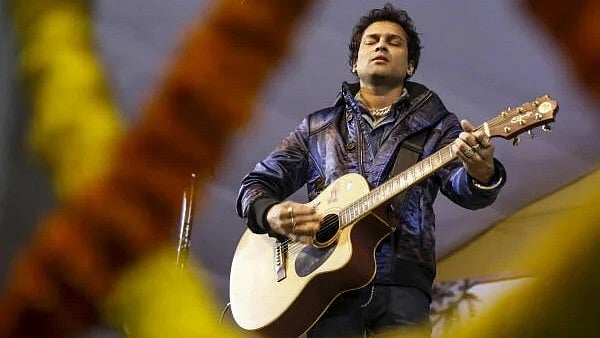
Zubeen Garg
Credit: PTI Photo
Now that the clamour of grief over Zubeen Garg’s passing has quietened, the question remains: what of him must endure? Crowds have dispersed, hashtags have faded, but the lessons of his life are not to be shelved alongside memory. To mourn him is natural; to carry forward his spirit is essential.
The sudden death of Zubeen Garg more than a month ago shook Assam and the wider music world. Streets filled with mourners, social media became a sea of tributes, and voices across generations sang his songs in unison. This was more than the farewell to a beloved singer; it was the recognition of a cultural leader who shaped the imagination of an entire people.
At a time when fame often creates distance, Zubeen refused to detach. He lived in the same house, among the same neighbours, and knew them by name. He was fearless both in his art and his convictions. He told young people again and again: if you are on the right path, there is no reason to
fear. These were not empty words; they were principles he lived by.
He spurned the easy lure of wealth of Bollywood and reminded his audiences that truth and meaning mattered more than profit. For him, an artist was never just an entertainer but a custodian of society’s conscience.
That sense of responsibility made him different. In a world where art is often commodified and silence rewarded, Zubeen used his platform to speak uncomfortable truths.
He became a voice of Assamese identity at a time when cultural confidence mattered deeply. His songs like Ei Prithibi were not just melodies but rallying cries. With Ya Ali, which carried his voice across India and beyond, he showed that Assamese music could be global without losing its roots.
His power lay in authenticity. He never wore a mask, never created a public persona separate from the man. His simplicity disarmed, his generosity touched lives, and his honesty won trust. Audiences felt he belonged to them, that his songs contained fragments of their own struggles, loves, and hopes. This was why his music mobilised people more effectively than any political speech could.
He also took responsibility beyond music. He raised his voice for Assam’s forests and rivers, for cultural preservation, and for issues that many celebrities avoided. Controversies came, but he showed that leadership is not about pleasing everyone — it is about conviction.
And there was his quiet philanthropy. Few knew he had adopted 15 underprivileged children, because he never turned charity into performance. In an era when generosity is often measured in Instagram posts, Zubeen gave quietly, as naturally as he sang. That too was leadership — values lived, not displayed.
His death revealed how deeply he was woven into people’s lives. But it also exposed a flaw in us: why do we wait until our heroes are gone to recognise their worth? In today’s world of fleeting trends and instant celebrity, courage, integrity, and generosity rarely make headlines. Zubeen embodied them all. He was celebrated in life, but the flood of recognition after his passing showed how much more we could have honoured him while he was here.
Leadership, he showed, does not only belong to politicians or CEOs. It can come from a song, from courage in the face of pressure, from generosity practised in silence. His life is a reminder that true leadership is not measured in titles or followers, but in the ability to stir hearts, speak truth, and remain fearless when it matters most.
As the clamour of mourning fades, Zubeen Garg must not be reduced to nostalgia. To truly honour him is to carry forward his lessons: that art is a responsibility, not just a career; that truth matters more than profit; that simplicity, honesty, and generosity are leadership in their purest form.
His voice will echo in Assam for generations, but it is his message that must live on. And perhaps the best tribute we can pay him is this: to learn to celebrate our living heroes now, before it is too late.
(The writer is the founder and CEO of the Parikrma Humanity Foundation)